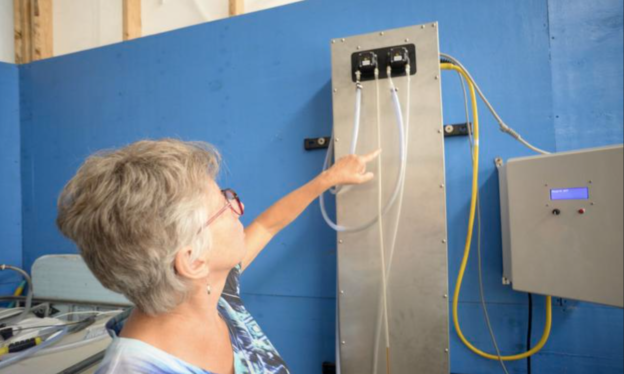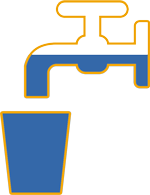Back to all articles
Rich Earth Spinoff, Brightwater Tools, receives $1M NSF Funding

Image Credit: Kristopher Radder Brattleboro Reformer
Brightwater Tools, which started in 2019 as a spin-off company of the non-profit Rich Earth Institute, has received a one-million-dollar grant from the National Science Foundation’s Phase II Small Business Innovation Research program. Brightwater Tools develops systems that can convert a building’s wastewater into fertilizer and clean water to save money, protect water resources, and support local farms. In the next two years, the team will build, test and install a minimum of three units of a novel, building scale, high strength wastewater treatment system.
“Toilets of the future won’t look much different than today’s, but how we manage what we send down them is going to change dramatically,” stated Kim Nace, CEO of Brightwater Tools.
In the conventional paradigm, our toilet streams are combined with all other domestic wastes–from showers, sinks, and washing machines–as well as industrial manufacturing waste. Wastewater treatment systems then remove pathogens but often still release both nutrients and contaminants into the watershed, with harmful ecological ramifications. Rather than combining all these waters into one dilute stream, Brightwater’s technologies invert the paradigm by separating out and recycling the largest source of nutrients in wastewater: toilet “resources.”
Brightwater’s treatment process transforms what would otherwise be a source of water pollution into a renewable source of fertilizer. The production of a clean, domestically-produced fertilizer (recovering nutrients from wastewater) for use in agriculture is a crucial response to the extreme volatility in fertilizer prices that has resulted from factors including the Russia-Ukraine conflict.
The Brightwater system also conserves precious water supplies and facilitates the on site reuse of greywater. The system is highly energy efficient and reduces the greenhouse-gas emissions produced by both wastewater treatment and fertilizer production.
“Decentralized or distributed wastewater systems will be the climate resilient infrastructure of tomorrow,” says Research and Technical Director, Abraham Noe-Hays. “Our company is poised to provide the necessary tools that will transform how we manage what once was considered waste, and turn it into a resource. We are completing the nutrient cycle.”
Source-separating bathroom fixtures (waterless urinals, urine-diverting toilets, and vacuum-flush toilets) will direct the waste through dedicated plumbing to a compact building-scale processor, which converts it into a liquid fertilizer. The system uses novel technologies necessary to stabilize, concentrate, sanitize and filter high strength wastewater. It will be deployed in multi-story buildings in both urban and rural settings.
The nonprofit Rich Earth Institute conducts research, education, and demonstration of urine nutrient recycling, largely focused on community-scale and home scale implementation. Brightwater Tools will enable an expansion of this work into larger building–scale systems.
“This innovative project has attracted a highly talented team of young engineers and scientists to Vermont,” notes Nace. To develop and market specific components of the system, Brightwater Tools is seeking additional investment which will garner a 50% match from NSF up to $500,000.
By cycling our nutrients, protecting our waterways, and reducing energy consumption, new sanitation systems will help create a regenerative future for our built environment. For more information, contact

